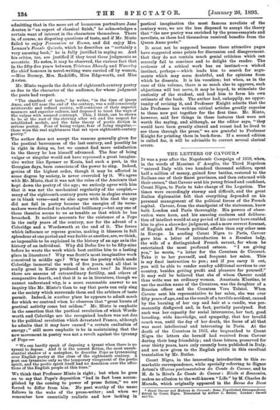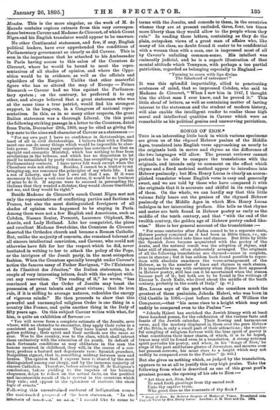THE LETTERS OF CAVOUR.*
IT was a year after the Napoleonic Campaign of 1859, when, in the words of Massimo d' Azeglio, the Third Napoleon "entered Italy with two hundred thousand soldiers, spent half a million of money, gained four battles, restored to the Italians one of their finest provinces, and then returned with their curses," that Cavour sent his young friend and confidant, Count Nigra, to Paris to take charge of the Legation. The times were exceedingly stormy and difficult, and the great Italian diplomatist felt that everything depended on his personal management of the political forces of the French capital. Cavour, from the standpoint of the statesman, knew both London and Paris thoroughly. His powers of obser- vation were keen, and his amazing coolness and delibera- tion of intellect would at any period of his career have enabled him to give a shrewder judgment, and a more correct forecast, of English and French political affairs than any other man in Europe. In sending Count Nigra to Paris, Cavour gave him a letter of introduction to a Russian lady, the wife of a distinguished French savant, for whom he entertained the most profound esteem. "I am giving you," he wrote, "a letter for the Countess de Circourt. Take it to her yourself, and frequent her salon. This is my final instruction to you ; and if you carry it out, you will be able to render sundry additional services to our country, besides getting profit and pleasure for yourself." It may well be believed that she of whom (favour could thus write was no ordinary woman. Anastasia Klustine, to use the maiden name of the Countess, was the daughter of a Russian officer and the Countess Vera Tolstoi. When Cavour sent his representative to her salon, she was over fifty years of age, and as the result of a terrible accident, caused by the burning of her cap and hair at a candle, was per- manently disfigured and, in fact, partially paralysed. But such was her capacity for social intercourse, her tact, good breeding, wide knowledge, and sympathy, that her invalid couch was, until the day of her death, the focus of all that was most intellectual and interesting in Paris. At the death of the Countess in 1863, she bequeathed to Count Nigra the letters she herself had received from Cavour during their long friendship ; and these letters, preserved for over thirty years, have only recently been published in Italy, and are now given to the English public in this excellent translation by Mr. Butler.
Count Nigra, in the interesting introduction to this re- markable correspondence, while specially referring to Signor Artoni's ffavres parlementaires du Comte de Cavour, and to M. de la Rive's Le Comte de Cavour Rgeits et Souvenirs, makes no allusion to the well-known "Life" by M. Charles de Mazade, which originally appeared in the Revue des Deux
• Count Cavour and Madame de Circourt: Some Unpublished Correspondence. Edited by Count Nigra. Translated by Arthur J. Butler. London : Cassell and Co.
3fondes. This is the more singular, as the work of M. de Mazade contains copious extracts from this very correspon- dence between Cavour and Madame de Circourt, of which Count Nigra and his English translator would appear to be unaware. No other Continental statesman, and few, if any, English political leaders, have ever apprehended the conditions of Parliamentary government so clearly as did Cavour. This is seen in the importance that he attached to his Ambassador in Paris having access to this salon of the Countess de Circourt, where he would be bound to meet the repre- sentatives of all shades of opinion, and where the Oppo- sition would be in evidence, as well as the officials and upholders of the Empire. Unlike that other masterful figure who has so altered the map of Europe — Prince Bismarck — Cavour had no bias against the Parliamen- tary system ; on the contrary, he preferred it to any other, and always believed that a great statesman who was at the same time a true patriot, would find his strongest support, in the long-run, in a Congress of national repre- sentatives. In this, as in so many other respects, the great Italian statesman was a thorough Liberal. On this point the following striking passage in a letter to the Countess, dated from Turin, December 29th, 1860, may be cited as giving the key-note to the aims and character of Cavortr as a statesman :—
"For my own part I have no confidence in dictatorships, and least of all in civil dictatorships. I believe that with a Parlia- ment one can do many things which would be impossible to abso- lute power. Thirteen years' experience has convinced me that an upright and energetic Ministry, which has nothing to fear from revelations in the tribune, and which has no disposition to let itself be intimidated by party violence, has everything to gain by Parliamentary contests. I have never felt weak except when the Chambers were not sitting. Besides, I cannot be a traitor to my bringing-up, nor renounce the principles of my whole life. I am a son of Liberty, and to her I owe all that I am. If it were necessary to throw a veil over her statue, it would be no business of mine to do it. If anyone were to succeed in persuading the Italians that they wanted a dictator, they would choose Garibaldi, not me, and they would be right."
Beside Madame de Circourt's couch Count Nigra met not only the representatives of conflicting parties and factions in France, but also the most distinguished foreigners of all shades of opinion who happened to be staying in Paris. Among them were not a few English and Americans, such as Cobden, Nassau Senior, Prescott, Laurence Oliphant, Mrs. Austin, and Lady Holland. Like her compatriot, the pious and excellent Madame S wet chine, the Countess de Circourt deserted the Orthodox church and became a Roman Catholic. Bat, unlike the majority of converts, she remained tolerant of all sincere intellectual conviction, and Cavour, who could not otherwise have felt for her the respect which he did, never hesitated in writing to her to attack the policy of the Pope, or the intrigues of the Jesuit party, in the most outspoken fashion. When the Countess specially brought under Cavour's notice the famous essay of Father Ravignan, "De l'Existence et de l'Institut des Jesuites," the Italian statesman, in a couple of very interesting letters, dealt with the subject with- out any reservation. "The reading of it," he wrote, "has convinced me that the Order of Jesuits may boast the possession of great talents and great virtues ; that its iron rule, if it is stifling to average natures, redoubles the energy of vigorous minds." He then proceeds to show that this powerful and unexampled religious Order is one thing in a country like France, and quite another thing in the Italy of fifty years ago. On this subject Cavour writes with what, for him, is quite an exhibition of fervour :—
"You will never form a complete estimate of the Jesuits, save where, with no obstacles to encounter, they apply their rules in a consistent and logical manner. They have learnt nothing, for- gotten nothing ; their spirit and their methods are the same as ever. Woe to the country, woe to the class, which shall intrust them exclusively with the education of its youth. In default of such fortunate conditions as may obliterate in the man the lessons received in childhood, they will, in the course of a cen- tury, produce a bastard and degenerate race : Spanish grandees, Neapolitan signori, that is, something midway between men and brutes. The opinion that I Express here is shared by the most distinguished among our clergy, and by the immense majority of sincere Catholics. Tberefuro, before admitting M. de R.tvignan's conclusions, before yielding to the impetus of his buining eloquence, deign to reflect on the actual facts, on the positive and incontestible result of thtir revival in the countries which they rule ; and oppose to the si.ludour of rhetoric the atom logic of events."
Following this unrestrained outburst of indignation comes the cool-headed prowl- 4.f he born statesman. "In the interests of ' 1 eaould like to come to
terms with the Jesuits, and concede to them, in the countries whence they are at present excluded, three, four, ten times more liberty than they would allow to the people whom they rule." In reading these letters, containing as they do the plain, outspoken views of a great man of affairs who, like many of his class, no doubt found it easier to be confidential with a woman than with a man, one is impressed most of all by Cavour's unfailing common-sense. His intellect was eminently judicial, and he is a superb illustration of that mental attitude which Tennyson, with perhaps a too partial patriotism, regarded as belonging especially to England :—
"Turning to scorn with lips divine
The falsehood of extremes ! "
It was this splendid impartiality, allied to penetrating acuteness of mind, that so impressed Cobden, who said to Madame de Circourt, " When I saw him in 1847, I thought him the ablest man I ever knew, and he proved it." This little sheaf of letters, as well as containing matter of lasting interest to the statesman and the student of modern history, will also enable the intelligent reader to realise those high moral and intellectual qualities in Cavour which were as remarkable as his political genius and unswerving patriotism.



















































 Previous page
Previous page